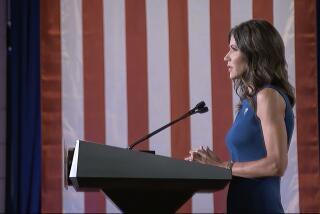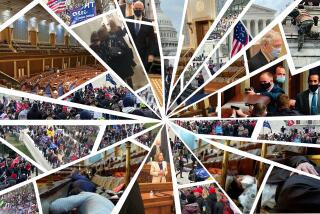Campaign Finance Bill Will Get Early Senate Hearing
The Senate Republican leadership agreed Friday to begin debate by the end of March on legislation to reform campaign finance laws, a breakthrough for those seeking to curb the influence of deep-pocket contributors on U.S. politics.
The deal represented a victory for Sen. John McCain (R-Ariz.) and others seeking to ban the largely unlimited donations to political parties known as soft money.
Previously, Senate Majority Leader Trent Lott (R-Miss.) had sought to hold off the campaign finance bill until May, arguing that President Bush’s agenda deserved first call on the Senate calendar.
Under the agreement announced Friday, the Senate initially will focus on Bush’s education reform proposal. But it now appears likely that campaign finance will be debated before Bush’s tax cut legislation and perhaps before the administration’s budget plan.
“I think it’s a win-win for all concerned,” Lott said. “For the president, because we’ll keep our emphasis on the issues he wants to talk about; for Sen. McCain, because his issue will be considered in the early part of the year.”
An aide to Lott said the majority leader informed the White House of the deal on timing. It was not immediately known whether Bush supported the arrangement or merely acquiesced.
In recent years the House has twice passed measures that would ban donations of soft money. Both those efforts died in the Senate.
While the legislation languished, the 2000 campaign broke all fund-raising records. Soft-money contributions to the Republican and Democratic parties in 1999 and 2000 rose to $457 million--nearly double what was raised in the comparable period of the previous presidential campaign.
Under the agreement Lott announced Friday, the Senate will take up McCain’s bill no later than the week of March 26--possibly sooner--and give it two weeks of debate time.
Lott said he doubts that he would encourage or support a filibuster of the legislation, reversing his stance in previous years. “I want to get this issue done and out of the Senate,” he said.
Bush has kept his views concerning the reform effort close to the vest since taking office a week ago.
When Bush was battling McCain last year for the GOP presidential nomination, he criticized the Arizona senator’s proposal as unfair to the Republican Party. At the time, Bush said that a so-called paycheck protection provision--requiring unions to obtain consent from members before making political donations--would have to be part of any reform measure he could back.
But most Democrats would oppose any bill with such a provision, given that their party traditionally enjoys the vast bulk of union financial support.
During the campaign, Bush proposed a more limited campaign reform measure that would ban soft-money donations by corporations and labor unions but not by individuals.
Bush and McCain met at the White House earlier this week to discuss the campaign finance issue. But their disagreements remain unresolved and, even if McCain is able to steer a bill through Congress, the threat of a presidential veto looms.
The deal on Senate debate was something of a compromise for McCain, who at one point said that he would push for action on his measure within the first weeks of the new Congress.
Pro-reform groups hailed Friday’s announcement. “It’s very significant,” said Jeff Cronin, a spokesman for Common Cause. “It’s good news for us because it shows that people who have been opposed to this in the past know that the ground has shifted from beneath them.”
McCain and his bill’s co-sponsor, Sen. Russell D. Feingold (D-Wis.), plan a town hall meeting Monday in Little Rock, Ark., to promote their legislation--the first in a nationwide series. One purpose of the meetings is to increase public pressure on lawmakers who have opposed the reform bill in the past, such as Sen. Tim Hutchinson (R-Ark.), who is up for reelection in 2002.
Some campaign finance experts wonder whether the push for reform will spur a last fund-raising binge by the political parties, as the soft-money geyser faces the threat of a cap. “It will be interesting to see if there’s a rush to get the last call at the bar,” said Lawrence Noble, executive director of the Center for Responsive Politics and former general counsel of the Federal Election Commission.
More to Read
Get the L.A. Times Politics newsletter
Deeply reported insights into legislation, politics and policy from Sacramento, Washington and beyond. In your inbox three times per week.
You may occasionally receive promotional content from the Los Angeles Times.






